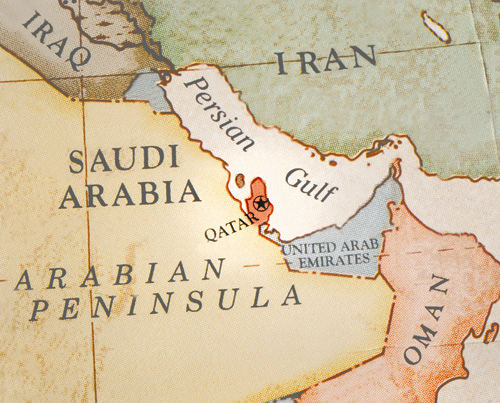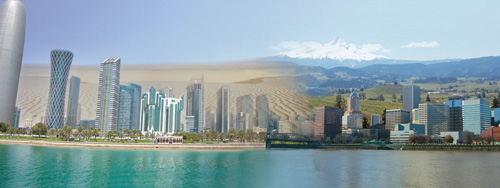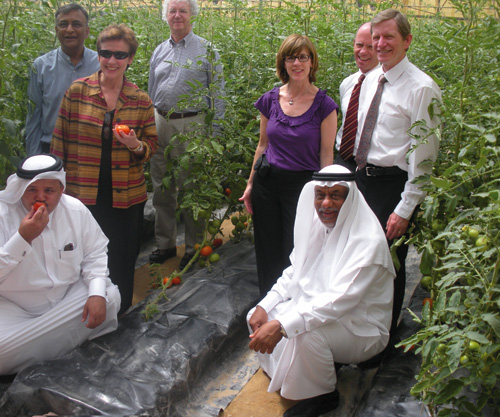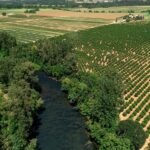 A desert Middle Eastern kingdom looks to Oregon to help solve its food security issues and evolve its sustainability.
A desert Middle Eastern kingdom looks to Oregon to help solve its food security issues and evolve its sustainability.
By Peter Beland
 Qatar is a Connecticut-sized country in the Persian Gulf that is rich in oil and natural gas, but poor in water. It has one of the highest per capita incomes in the world and its economy grew 19% in 2010. Doha, the capital city, has roughly tripled in size in the past 20 years. Because of this growth and its moonscape geography that supports little agriculture, the country imports 90% of its food. Food security is a serious issue for the small, desert country.
Qatar is a Connecticut-sized country in the Persian Gulf that is rich in oil and natural gas, but poor in water. It has one of the highest per capita incomes in the world and its economy grew 19% in 2010. Doha, the capital city, has roughly tripled in size in the past 20 years. Because of this growth and its moonscape geography that supports little agriculture, the country imports 90% of its food. Food security is a serious issue for the small, desert country.
Qatar had developed only 12% of its agricultural potential in 2009, according to the United Nation’s Food and Agriculture Organization. It could develop an additional 115,000 acres of land, but it would require extensive irrigation. The FAO estimates it could cost as much as $3,800 to develop every two-and-a-half acres of drip-irrigated land. With annual revenue surplus for the 2010-2011 fiscal year at $12 billion, Qatar has the capital to finance it. According to arabianbusiness.com, Qatar signed a deal with Kenya in 2008 to finance a $2.3 billion deepwater port on Kenya’s coast in exchange for a lease on nearly 100,000 acres of uncultivated land in Kenya for agricultural production.
The challenges of this Middle Eastern country are not unlike those that have faced Oregon, a state with recognized leadership in sustainability, and where solutions to an arid eastern landscape have led to irrigation and farming innovations that have transformed it into some of the most productive agricultural land in the world. Morrow County alone produces enough wheat annually to give every one of Qatar’s 1.7 million residents a loaf of bread every day for a year.
Sheikh Hamad Bin Ali Bin Jassim Al-Thani has taken notice of Portland’s leadership in urban sustainability and Eastern Oregon’s high-tech, dry-land agricultural operations. As vice chairman of Qatar’s National Food Security Program and member of the ruling family — and a Portland State University alum — Al-Thani is looking to Oregon’s technological and agricultural institutions to help his country overcome its food, water and energy challenges and develop into a regional powerhouse for sustainable urban and agricultural development.
As with most things, there was no seminal moment that led Al-Thani to the Beaver State to solve his country’s problems. It was more like old friends who run into each other and offer to help one another with contacts and skills they have developed over the years.

Qatar’s relationship with Oregon goes back decades. Since 1971, “about one in every 200 Qataris has gone to school in Oregon,” says Paul Pawlowski, SERA Architects’ senior urban designer and planner and point man for its Gulf region operations.
It’s more than likely that one of those one-out-of-every-200 Qataris knows someone who has spent time with Marvin Kaiser, dean emeritus of PSU’s College of Liberal Arts and Sciences. Kaiser has traveled to Qatar numerous times, as a PSU liaison and as a wedding guest of current and former students. “It isn’t just a business relationship,” he says. “It’s about the [personal] relationships and other things follow from that.”
Nancy Hamilton, senior policy adviser on economic development for former Gov. Ted Kulongoski, drew on Oregon’s personal network and longtime history with Qatar during a spring 2009 trip to an international green building conference in Phoenix. There she ran into Greg Acker of New York-based Turner Construction. Turner was contracted by the Qatari government to lead the development of Musherib, an 84-acre version of Portland’s Pearl District in Doha.
“I was thinking that we should export our intellectual capital on this,” says Hamilton, referring to Oregon’s advances in dry-land agriculture and sustainable development. On a trip to Washington, D.C., later that year, Hamilton, Kulongoski and others from Oregon were also looking for funding for the Oregon Sustainability Center, a flagship for the state’s sustainable architecture prowess set for completion in 2014. The $65 million project on the eastern edge of PSU is expected to break ground in early 2012.
Hamilton heard that Joseph LeBaron, the U.S. ambassador to Qatar who is from Ontario, Ore., was in D.C. with Qatar National Food Security Program chairman Fahad Bin Mohammed Al-Attiya and Al-Thani, and arranged a meeting with LeBaron. With Kaiser’s history with Qatar and LeBaron’s ties to Oregon, it wasn’t hard to get it set up.
 |
At a 2010 trip to the Al Sulaiteen Farm in Qatar, from left: Dr. Mohamed Al Maslamani, Dr. Mahendra Shah, Catherine Mater, Paul Pawlowski, Nancy Hamilton, Abdullah Salem Al Sulaiteen, Mark Edlen and Ron Adams. |
For months nothing came of the meeting. But in January 2010, Hamilton got a call from Al-Thani. He wanted to come to Oregon. One month later, Al-Thani came to visit his alma mater and the state that could hold the keys to Qatar’s future. During his weeklong trip he visited food processors in Portlandand Oregon State University agricultural researchers near Corvallis, and drove three hours to the wind-swept landscape of Boardman. There he toured GreenWood Resources’ poplar tree farm, along with Three Mile Canyon Farms. Three Mile oversees a 36,000-acre integrated dairy-crop farm that produces enough potatoes annually to fill more than 2 billion McDonald’s Happy Meals with a small bag of fries.
Three Mile works with far less water than it used to because of agreements it signed with environmental groups over declining salmon runs in the Columbia River. Just as Qatar is water-poor, Three Mile managers have had to innovate to use every drop of water they are allotted as effectively as possible. “It costs approximately $60 to $70 in pumping costs per acre foot. Water is money,” says Three Mile general manager Marty Myers. It costs as much as six times that amount to desalinate water in Qatar.
Three Mile has achieved enormous productivity through the use of GPS-guided tractors, remote-controlled pivot drip-irrigation sprayers, and other devices; its lush fields stand in stark contrast to the scrappy land surrounding it.
Al-Thani was so impressed with what he saw, he insisted that delegates from Oregon go to Qatar and visit with Fahad Al-Attiya, chairman of Qatar’s food security program, and others. Three months after Al-Thani’s visit, a group of academic, industry and government leaders set off for Doha.
The crew that arrived from Oregon in May 2010 was an unusual sight to the Qataris. Used to hyper-aggressive business delegations pushing for reduced tariffs or academic wonks a bit detached from reality, the Qataris were impressed by the collaborative nature of the hybrid group.
“They are interested in building private-public partnerships,” says David Kenney, executive director of Oregon BEST, the private-public research institution that helps fast-track research projects of Oregon’s universities to the commercial stage. “They don’t have their own expertise, though. They can afford to hire whomever they want to build their buildings. They will hire whomever they think is the best in the world.” Kenney says that is good news for Oregon when the subject is green building because “Oregon has some of the best resources in the world.”
Over the course of the week, the Oregon delegation visited farms in the Qatar desert. They toured the sights of Doha, including Education City, a massive conglomeration of buildings that houses Qatar University as well as programs from Texas A&M, MIT and Carnegie Mellon. PSU could be added to their ranks in the future. “During the trip in May,” says PSU’s Kaiser, “the vice president of academic affairs of Qatar University told me ‘Here’s what I need from you, Marvin. Would you help us develop our sustainability program?’” PSU will submit a proposal this fall to Qatar University that it fund a sustainable urbanism program in that country for three years at a cost of about $2 million. A decision is expected next summer.
Last November, Fahad Al-Attiya came to see for himself what Oregon had to offer and signed a memorandum of understanding with Kulongoski that declared Oregon and Qatar’s intent to work together on agricultural and sustainability issues. It signaled the next chapter of Oregon’s decades-long relationship with Qatar. In April, Qatar and the U.S. also signed an MOU on enhancing global food security.
Another example of future plans is the collaboration around the Oregon Sustainability Center. Kaiser and Pawlowski have approached through intermediaries Sheikha Moza bint Nasser, who oversees the educational Qatar Foundation, to help fund the center and construct a similar one in Doha that could serve as a bridge between Portland and Doha. “Imagine a place where young Qatari and Oregonian women can meet without leaving home,” says Pawlowski, referring to the proposed state-of-the-art video conference room in the center. “They can sit at a table and talk to each other.”
And Oregon State University dean of engineering Ronald Adams has been working with OSU researchers and Eastern Oregon’s agriculture players to develop a pilot farm to be developed in Qatar. OSU researcher Chadi Sayde impressed Al-Thani with his research involving the use of fiber optics for monitoring moisture levels in soil. Echo-based Madison Farms already has experimented with the fiber optics system and is working with OSU on other technologies to be integrated into the pilot farm project. The proposal has been made to the Qatar food security program and awaits approval and funding.
In a future that will be defined by access to technology and food, Qatar hopes to leverage its partnerships with Oregon to help secure the stability of not only its future, but that of its region.
“We want boots on the ground, evidence of experience. Oregon has the natural infrastructure for research,” says David Raboy, chief economist with the Qatar National Food Security Program.
“It is a country with a lot of resources,” says Kaiser. “It’s a country of aspirations, but also of needs. They’re looking for strong partners that can help meet those needs.”



